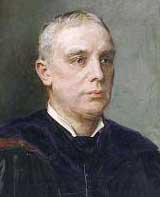| Profile | Major Works | Resources |
Rev. Elisha Benjamin Andrews, 1847-1917.
Early American Baptist minister, historian, economist, educator and president of Brown University.
Elisha Benjamin Andrews was born in Hinsdale, New Jersey, the son of a line of Baptist ministers. He interrupted his studies at the Connecticut Literary Institute, a Baptist academy in Suffield, Connecticut, to enlist in the Union Army, and served during the Civil War. He was discharged after being wounded in October 1864 and losing the sight in one eye at the battle of Petersburg. After the war, Andrews resumed his studies, and, after some preparation, eventually enrolled at Brown University in 1866, graduating in 1870.
For the next two years, Andrews served as principal of the
Connecticut Literary Institute. Intent on entering the Baptist ministry.
Andrews enrolled at the Newton Theological Institution in 1872,
graduating in 1874. He was ordained a Baptist minister in July
1874. E. Benjamin Andrews subsequently served for a year as a
pastor in Beverly, Massachusetts before being tapped to take up the
presidency of Denison University in Granville, Ohio in 1875. At
Denison, Andrews was mentor of future
Chicago president W.R. Harper. Andrews left Denison in 1879,
to teach theology at Newton TI, while simultaneously teaching philosophy
courses nearby at Colby College.
In 1882, E. Benjamin Andrews was appointed by Brown University to become
professor of history and political economy. He delayed his appointment
by a year, to undertake an academic tour in
Germany, studying in Berlin and
Munich, and coming under the influence of the
German Historical School.
Andrews parlayed his lectures at Brown into a series of textbooks. In
1888, Andrews left Brown to take up an appointment as professor of
economics and public finance at Cornell.
But he did not stay for long. After merely a year, E. Benjamin
Andrews was elected to take up the presidency of Brown University in
1889. Following American tradition of college presidents, E. Benjamin
Andrews was responsible for the moral philosophy course at Brown, which
included elements of political economy. Andrews is regarded as a
watershed president of Brown, presiding over the expansion of the
college, and its transformation into a modern university. Andrews
expanded the offerings in economics, modern languages and science.
Andrews served as president of Brown for a decade. During this period,
Andrews continued contributing to economics debates, and served as US
Commissioner to the International Monetary Conference in Brussels in
1892. In 1897, he was briefly associated with Cosmopolitan
University, a fledgling correspondence college financed by
Cosmopolitan magazine owner, J.B. Walker.
In 1897, Andrews got embroiled in a controversy with the Trustees of Brown University. Andrews was a long-time supporter of bimetallism and the free coinage of silver, which became a major issue in the 1896 US election. The Brown trustees complained that Andrews was frightening off donors, and, at a meeting in July 1897, requested that he change his position. Andrews refused and promptly resigned. It quickly became a much-advertised case of academic freedom, and fellow professors and alumni pressured Brown to reject his resignation. The matter seemed resolved, but the atmosphere remain charged. Andrews stayed on at Brown for one more year, before finally resigning in July 1898, to take up a position as superintendent of Chicago public schools.
Andrews moved again in 1900, to become chancellor at the University of Nebraska. E. Benjamin Andrews retired from Nebraska in 1908.
|
Major Works of Elisha Benjamin Andrews
|
|
HET
|
|
Resources on E. Benjamin Andrews
|
All rights reserved, Gonçalo L. Fonseca

